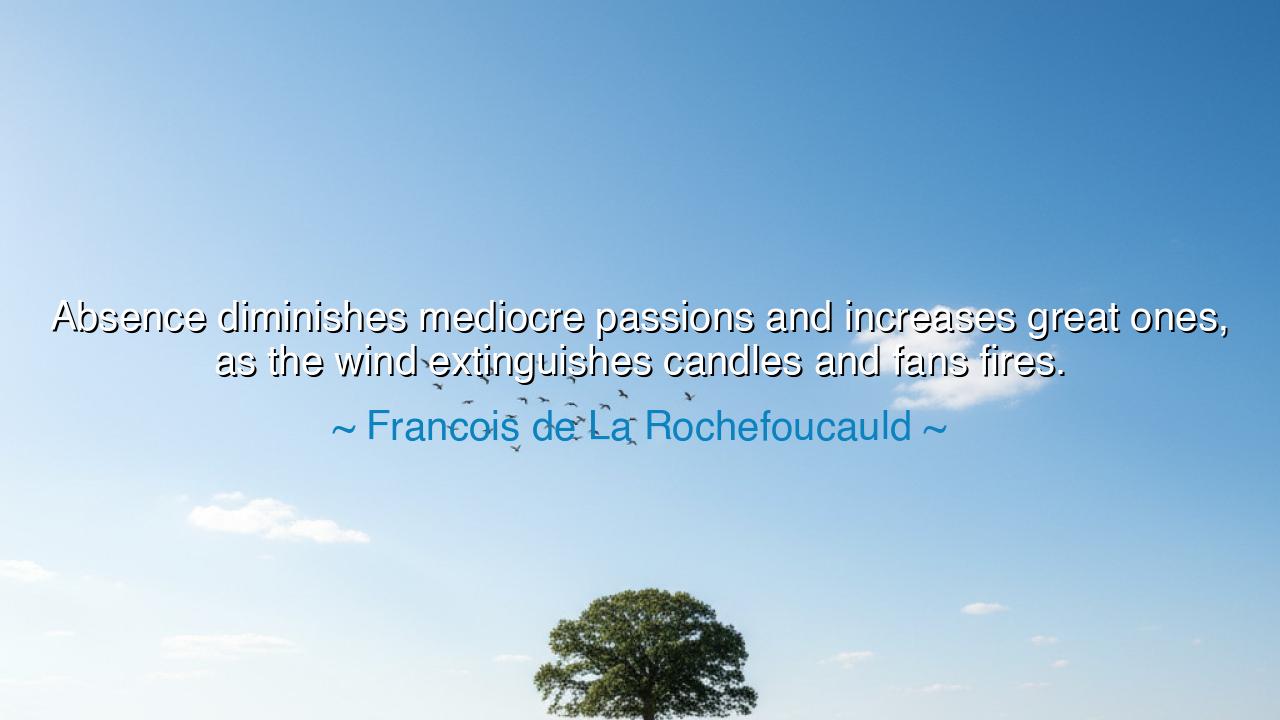
Absence diminishes mediocre passions and increases great ones, as
Absence diminishes mediocre passions and increases great ones, as the wind extinguishes candles and fans fires.






Hearken, O seekers of wisdom, to the enduring words of Francois de La Rochefoucauld, who observed: “Absence diminishes mediocre passions and increases great ones, as the wind extinguishes candles and fans fires.” In these words lies a meditation upon the nature of desire, attachment, and the endurance of true affection. La Rochefoucauld, keen observer of the human heart, teaches that fleeting passions are fragile and transient, easily extinguished by distance, whereas profound and genuine attachments are strengthened, intensified, and purified through the trials of separation.
From the earliest civilizations, sages and poets understood that the absence of the beloved or the desired tests the resilience of the soul. In the epics of Greece, the long absence of Penelope’s Odysseus stirred both anxiety and longing, yet it also deepened the fidelity of her love. La Rochefoucauld’s aphorism mirrors this timeless insight: distance acts as a crucible, separating what is ephemeral from what is enduring, revealing the strength of true passions through trial.
The metaphor he employs — “as the wind extinguishes candles and fans fires” — is itself profound. The wind, indifferent and impartial, destroys what is weak while amplifying what is strong. Likewise, the pressures of life, the spaces of absence, and the challenges of separation expose the fragility of shallow desire while intensifying genuine devotion. This duality is reflected in human relationships across history, showing that true intensity survives hardship, whereas superficial attachment fades.
Consider the love of Abelard and Heloise, whose passion endured not in the comfort of proximity, but through letters exchanged across distance and adversity. Though torn apart by circumstance, their correspondence reveals an attachment strengthened by absence, a fire fanned by longing and intellectual intimacy. Their story embodies La Rochefoucauld’s principle: great passions thrive and deepen when tested, while lesser ones are extinguished by the winds of life.
The aphorism also applies to ambition and purpose. The pursuit of excellence, when separated from distraction and superficial gratifications, becomes sharper and more intense. Think of Nelson Mandela, imprisoned for decades, yet whose vision for justice and freedom grew only more powerful with absence from the world he sought to transform. Mediocre desires fade when tested by adversity, yet noble aims, like enduring fires, are fanned and clarified by distance and trial.
From this reflection emerges a universal lesson: absence is not to be feared, nor is it inherently a source of loss. Rather, it serves as a measure, a test, and a purifier. What endures in its presence is genuine; what vanishes is weak. By recognizing this, one can embrace separation, challenge, and delay not with despair, but with patience, discernment, and appreciation for the passions that are truly worthy.
Practical counsel flows naturally: do not cling to every desire or attachment as if permanence is guaranteed. Observe which passions survive distance and adversity, and invest in those that endure. Whether in love, friendship, or purpose, allow trials and absence to clarify the heart, and be willing to release that which cannot withstand the test. In this way, one cultivates strength, discernment, and devotion that are tested and true.
Thus, O listener, let the words of La Rochefoucauld illuminate your path: absence is both judge and teacher. It extinguishes the weak and fans the strong, revealing the depth of your affections, ambitions, and commitments. Embrace distance, adversity, and the winds of life, and let them strengthen what is true, reveal what is fleeting, and kindle the enduring fires of the human spirit.






AAdministratorAdministrator
Welcome, honored guests. Please leave a comment, we will respond soon